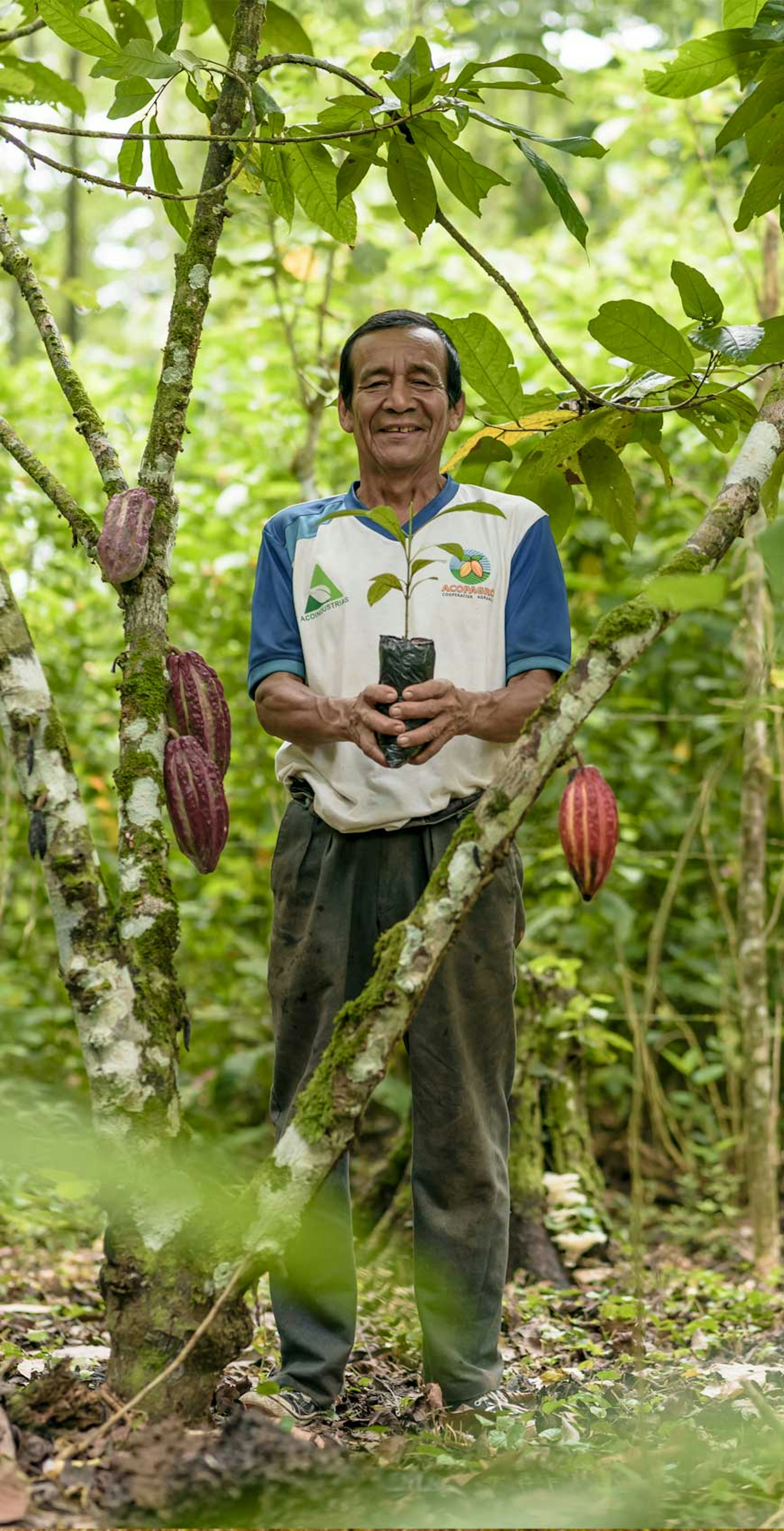Salient Issue
Climate change and deforestation
Agri-food systems are responsible for 31% of human-caused greenhouse gas emissions, according to the FAO. Depending on the product, major sources of emissions include the clearing of land, fertilizer use, processing, transportation or retail.
Deforestation is a significant contributor to climate change and mainly caused by the clearing of land for agriculture – 73% of all global deforestation is caused by agricultural expansion.
Tropical rainforests are critical to the planet’s survival and have among the highest carbon storage of any ecosystem. Although the commodities responsible for the bulk of deforestation – soy, beef and palm oil – are not in Fairtrade’s portfolio, cocoa and coffee have significant impacts on tropical rainforests. The most affected areas include the Upper Guinean Rainforest in West Africa, the Amazon in Latin America, and rainforests across in Southeast Asia. In the Amazon, another leading driver of deforestation is gold mining.
Slash and burn techniques are still used by some agricultural producers, for example in banana production in the Philippines.
Fertilisers often contain nitrous oxide — the third-largest contributor to climate change. While correct fertiliser application can improve output, overuse leads to higher emissions and higher costs for farmers without further improvements to yields. Globally, fertilizer use is particularly high in East and South Asia and prevalent in commodities like maize, rice, wheat and vegetables .
Harmful emissions are also produced by other farm operations. Fossil fuels help run machinery. Traditional sugarcane production involves burning cane fields prior to harvesting. In traditional rice paddies, the soil is covered in water and deprived of oxygen, which releases methane gas, making rice production accountable for 1.2% of all global greenhouse gas emissions. In coffee processing, the pulp generated when coffee cherries are processed can produce notable methane emissions, if handled improperly.
The choice of a production method can cut emissions significantly. Kenyan Fairtrade roses available on European markets, for example, have a significantly lower climate footprint than Dutch gas-heated greenhouse-grown roses, even if the former are transported by air.
Nevertheless, for many products, most carbon emissions accrue in the later stages in the supply chain. In cotton and wine, for example, many of the later production stages are energy intensive. While cotton production is estimated to contribute less than 1% of total global carbon emissions, the global fashion industry accounts for 3-10% of all emissions.
In the wine industry, transport is responsible for 55-65% of the generated carbon emissions, while the rest accrues from glass bottles, heavy machinery and the specific temperature necessary for wine storage. As such, many Chilean wines are now transported by sea, which causes significantly fewer emissions than air freight.

According to research
Fairtrade certification has a positive impact on farmers’ and farmer organisations’ climate change related knowledge and practices.
Exploring Fairtrade’s Impact, 2020, page 34.

Action
Fairtrade's response
Although smallholder agriculture causes relatively few emissions, agriculture as a whole is a leading contributor to land use changes that drive climate change. Climate change also has a dramatic impact on the livelihood of many farmer households.
Climate resilience of farmers, workers and their organisations is a core goal in Fairtrade’s global strategy. Fairtrade’s policies and work on climate change and environmental sustainability is guided by centre of Excellence and strategy for climate and the environment. In 2024 we adopted a new policy position on sustainable agriculture, emphasising an agroecological approach in striving for agricultural change.
Importantly, Fairtrade’s Producer Networks in Africa, Asia and Latin America have developed a common approach for climate change mitigation and adaptation work.
Fairtrade's response in detail
1. Preventive and mitigating measures
Fairtrade utilises a variety of approaches to promote climate change mitigation1 at farmer organisations and plantations. The Fairtrade Standards are one of the approaches and include several requirements related to climate change:
- Environmental management. Fairtrade certified farmer organisations and plantations need to clearly assign the responsibility for environmental management to one person or a group of persons. Plantations are also required to implement measures to raise environmental awareness among workers.
- Deforestation. Farmer organisations must avoid causing deforestation or destroying natural vegetation and must have procedures in place to ensure this. Both farmer organisations and plantations must avoid harming protected areas or areas with high conservation value.
- Energy use. If central processing facilities use non-renewable energy, plantations are required, and farmer organisations are encouraged to keep records of and reduce the use of non-renewable energy.
- Soil fertility. Plantations are required, and farmer organisations are encouraged to implement measures that enhance soil fertility. Further, both organisation types are encouraged to identify land at risk for soil erosion and take measures to reduce and prevent soil erosion.
- Climate adaptation. Coffee producers need to make climate adaptation plans, and all farmer organisations are expected to implement some adaptation measures as per to the SPO standards.
- Environmental risk assessment. Coffee and cocoa producers need to make regular assessments of environmental risks that affect their members agricultural performance and climate resilience.
Please see the Water and Biodiversity page for further information. In total, environmental criteria within the Fairtrade standards account for one third of all criteria for both farmer organisations and plantations. In recent years, Fairtrade has expanded the number and scope of environmental criteria for all farmer organisations, and particularly for those producing coffee or cocoa. For example, our recent reviews of the cocoa and coffee standards include cut-off dates after which products must be deforestation-free, monitoring measures as well as investments to tackle the root causes of deforestation.
Nevertheless, standards requirements and auditing alone are insufficient to address climate change. That is why Fairtrade approaches climate change issues in several ways, including:
- Training on climate change mitigation and adaptation is offered to farmer organisations and plantations by Fairtrade Producer Networks in Africa, Asia and Latin America. Fairtrade’s Climate Academy programme, currently focused on East Africa, reached directly 8 000 farmers and indirectly over 26 000 farmers, including 5 000 female farmers. Online training materials are made available to all certified entities. Although awareness on climate issues has increased, a 2022 study on Fairtrade’s impact showed mixed results regarding awareness and performance at farmer organisations.
- The Fairtrade Premium allows farmer organisations and workers to invest in good agricultural practices and climate change adaptation. To incentivise organic production, organic producers also receive an additional differential. Further information about Premium allocation can be found on the website of Fairtrade International.
- Carbon credits. The Fairtrade Climate Standard supports smallholders and rural communities to produce Fairtrade Carbon Credits and receive funding for climate change mitigation and adaptation efforts. Unlike other carbon credit schemes, Fairtrade sets both a minimum price and a premium for carbon credits, to cover the actual production costs and allow producers to invest in further climate measures. Buyers are also obliged to reduce their emissions. For example, Fairtrade’s Carbon Innovation Fund project enables Ugandan coffee farmers to earn additional income through reducing emissions. Instead of using firewood for cooking, the project supports reusing the waste from coffee production, from which the coffee producers earn carbon credits.
- Development projects support producers’ climate efforts. An analysis of ten major climate change adaptation projects among Fairtrade producers showed positive impacts. The 2021–2023 Sustainable Banana Project supported by the French Development Agency and Carrefour succeeded to increase the Dominican and Peruvian participating farms’ yields and got 93 percent of participators using organic fertilizers and pesticides. For information on current projects, please see Fairtrade’s Impact Map.
- Collaboration among supply chain actors. Fairtrade promotes and facilitates collaboration, encouraging retailers, brands and traders to co-invest in climate change mitigation and adaptation in their supply chains. These investments are important to many farmer organisations who have limited resources or access to financing. Agroforestry methodologies and deforestation monitoring require significant resources.
- Multistakeholder collaboration. Fairtrade participates actively in climate related initiatives. For example, we participate in the development of OECD/FAO’s Deforestation Due Diligence Handbook and in ISEAL's work on how to account and report on Scope 3 emission reductions towards performance targets. Fairtrade is an active member of the Cool Farm Alliance and the Value Chain Initiative, and both networks enable amplifying capacities on carbon reporting and measurement for mitigation purposes. On food system transformation, Fairtrade is an active member of the True Value of Food Initiative.
- Partnerships. Fairtrade has ongoing collaboration on climate issues with many organisations, including the Alliance CIFOR-ICRAF, The Gold standard Foundation, Save the Children, Cool Farm Alliance and Grow Ahead, to name just a few. In 2023, Fairtrade started a partnership with Satelligence to map deforestation risks with satellite information.
- Awareness raising in producing and consuming countries. Fairtrade’s studies and communication efforts raise awareness about the threats that climate change poses to farmers, workers, food security and the global food supply. Good examples include Fairtrade Climate Academy training videos and the Fairtrade and Climate Change hotspot analysis.
- Advocacy work. Fairtrade advocates for legislation and binding international treaties on climate change, highlighting the needs of smallholder farmers and farm workers. Recent efforts include advocacy work related to the EU’s CSDDD and the recent and upcoming COPs.
- At the export, import and manufacturing stages, it is important to manage transport-related emissions. Fairtrade supports pilot projects to reduce emissions along the supply chains. For example, our research on transporting flowers by sea instead of air shows dramatically reducing transport-related emissions.
The Fairtrade Trader Standard further requires companies to be aware of and not violate applicable laws on energy use, climate emissions and environment in general. Compliance with these requirements is checked in audits if there are any prior indications of non-compliance2.
In addition, traders must comply with Fairtrade’s pricing and Premium requirements, which allow farmer organisations and plantations to invest in environmental sustainability. Traders are also encouraged to reduce their carbon footprint and other negative environmental impacts.
1: Mitigating measures reduce the likelihood of an adverse impact (UNGP Interpretive Guide, p. 12). In the context of climate change, mitigation refers to reduction or greenhouse gas emissions or removal of greenhouse gases from the atmosphere.
2: Indications can be obtained e.g. via allegations made by third parties or via observations during trader audits.
2. Remediating measures
Every human being has a right to a clean, healthy and sustainable environment. This was confirmed by the General Assembly of the United Nations on 26 July 2022. Climate protection has also been recognised as a human right by several courts, including the German Constitutional Court (2021).
In 2024, the European Court of Human Rights ruled that insufficient action to counter climate change is a violation of human rights. However, it is still very rare for victims of climate change – or of weak government or corporate action on climate change – to gain remediation3.
Small-scale farming households are among those who contribute the least to climate change, and yet they suffer the greatest impacts. Agricultural productivity already suffers from climate change, which is spurring drought, desertification, and wildfires on the one hand and heavy rains, floods, and erosion on the other.
The adverse impacts of climate change are ecological, social and economic. For millions of farmers, the ecological changes make growing seasons shorter and more unpredictable. This endangers the standard of living, nutrition, health, education and social standing of farmers, their families, and their communities. It also dramatically affects the global supply chains of food, putting global food security at risk.
Overall, Fairtrade producers flag climate change as the biggest risk they face.
Climate change remediation includes both avoiding further damage by reducing emissions and ensuring adaptation and building resilience. Fairtrade seeks to support farmers, workers and their organisations with this work. Fairtrade is taking part to climate COPs with a delegation of farmers and workers. Fairtrade makes two key pleas: more climate finance accessible to smallholder farmers, and an enabling policy environment at the intersection of social, trade and climate justice. More information can be found here.
In our climate-related training and capacity-building work, we explore how farmers can adapt agricultural methods to the changing climate. Demonstration plots are used to test different ways of pruning, fertilising, irrigating and gaining shade, providing visible evidence of how farmers can improve their practices.
Fairtrade Premium and climate change adaptation projects funded by public donors or companies also support adaptation measures by farmers, workers and their communities. A good example is training farmers to the use of Good Agricultural Practices (GAPs), which aid adaptation to harsher weather conditions. On a similar note, the Sankofa project promotes the use of agroforestry methods, which both increase crop diversification, soil health and household income. The Fairtrade Carbon Credit projects bring additional climate funding from downstream business partners and aim to reduce further climate damage. These projects always establish a grievance mechanism, in order that any disputes can be solved early, and lessons can be learnt from any grievances.
3: Remediation refers to the process of counteracting or fixing a human rights violation through measures that can include apologies, restitution, rehabilitation, financial or non-financial compensation, and punitive sanctions, as well as preventing the repetition or further cases of harm (UNGP Interpretive Guide, p. 12).

According to farmers
Fairtrade’s Sankofa project taught me not to burn the land and keep trees and organic matter to keep the soil moist. Cocoa does well under this system.
Cocoa Farmer Emelia Deborah from Sankore. Ghana. Fairtrade climate change projects, 2021, page 30.